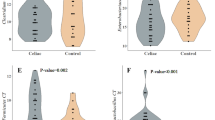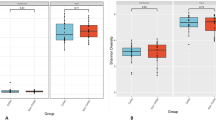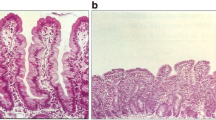Abstract
Background and Aims
In nonresponsive celiac disease (NRCD), the symptoms and duodenal damage persist despite a gluten-free diet. Celiac disease patients with persistent symptoms are found to have a dysbiotic microbiota. We thus hypothesized that increased seroreactivity to the serum gluten-sensitive microbial antibodies Saccharomyces cerevisiae (ASCA), Pseudomonas fluorescens-associated sequence (I2), and Bacteroides caccae TonB-linked outer membrane protein (OmpW) is associated with NRCD.
Methods
ASCA, I2 and OmpW were measured in 20 seronegative CD patients with persistent villous damage despite strict dietary treatment (NRCD group). Fifty-eight responsive patients served as CD controls (55 on gluten-free treatment) and 80 blood donors as non-CD controls.
Results
At least one microbial marker was positive in 80% of NRCD patients, in 97% of untreated CD and 87% of treated CD patients, and in 44% of controls. NRCD patients had the highest frequency of ASCA positivity (65% vs 52, 20, and 0%, respectively) and also significantly higher ASCA IgA (median 14.5 U/ml) and IgG (32.5 U/ml) titers than treated CD patients (7.0 U/ml, 13.0 U/ml) and non-CD controls (4.5 U/ml, 5.8 U/ml). The frequencies of I2 and OmpW were lower in NRCD than in untreated CD (65% and 45% vs 86% and 59%, respectively), and I2 titers were higher in NRCD (median absorbance 0.76) and untreated (1.0) and treated (0.83) CD than controls (0.32). OmpW was elevated in untreated (1.1) and treated (0.94) CD patients compared with controls (0.79).
Conclusions
Seropositivity and high titers of ASCA are associated with NRCD and might serve as an additional follow-up tool in CD.


Similar content being viewed by others
References
Abdulkarim AS, Burgart LJ, See J, Murray JA. Etiology of nonresponsive celiac disease: results of a systematic approach. Am J Gastroenterol. 2002;97:2016–2021.
Leffler DA, Dennis M, Hyett B, Kelly E, Schuppan D, Kelly CP. Etiologies and predictors of diagnosis in nonresponsive celiac disease. Clin Gastroenterol Hepatol. 2007;5:445–450.
Stasi E, Marafini I, Caruso R, et al. Frequency and cause of persistent symptoms in celiac disease patients on a long-term gluten-free diet. J Clin Gastroenterol. 2016;50:239–243.
Ilus T, Kaukinen K, Virta LJ, et al. Refractory coeliac disease in a country with a high prevalence of clinically-diagnosed coeliac disease. Aliment Pharmacol Ther. 2014;39:418–425.
De Palma G, Nadal I, Medina M, et al. Intestinal dysbiosis and reduced immunoglobulin-coated bacteria associated with coeliac disease in children. BMC Microbiol. 2010;10:63.
Sartor RB, Wu GD. Roles for intestinal bacteria, viruses, and fungi in pathogenesis of inflammatory bowel diseases and therapeutic approaches. Gastroenterology. 2017;152:327.
Iltanen S, Tervo L, Halttunen T, et al. Elevated serum anti-I2 and anti-OmpW antibody levels in children with IBD. Inflamm Bowel Dis. 2006;12:389–394.
Ashorn S, Honkanen T, Kolho KL, et al. Fecal calprotectin levels and serological responses to microbial antigens among children and adolescents with inflammatory bowel disease. Inflamm Bowel Dis. 2009;15:199–205.
Landers CJ, Cohavy O, Misra R, et al. Selected loss of tolerance evidenced by Crohn’s disease-associated immune responses to auto- and microbial antigens. Gastroenterology. 2002;123:689–699.
Wacklin P, Laurikka P, Lindfors K, et al. Altered duodenal microbiota composition in celiac disease patients suffering from persistent symptoms on a long-term gluten-free diet. Am J Gastroenterol. 2014;109:1933–1941.
Forcione DG, Rosen MJ, Kisiel JB, Sands BE. Anti-Saccharomyces cerevisiae antibody (ASCA) positivity is associated with increased risk for early surgery in Crohn’s disease. Gut. 2004;53:1117–1122.
Papp M, Altorjay I, Dotan N, et al. New serological markers for inflammatory bowel disease are associated with earlier age at onset, complicated disease behavior, risk for surgery, and NOD2/CARD15 genotype in a Hungarian IBD cohort. Am J Gastroenterol. 2008;103:665–681.
Arnott ID, Landers CJ, Nimmo EJ, et al. Sero-reactivity to microbial components in Crohn’s disease is associated with disease severity and progression, but not NOD2/CARD15 genotype. Am J Gastroenterol. 2004;99:2376–2384.
Mow WS, Vasiliauskas EA, Lin YC, et al. Association of antibody responses to microbial antigens and complications of small bowel Crohn’s disease. Gastroenterology. 2004;126:414–424.
Granito A, Zauli D, Muratori P, et al. Anti-Saccharomyces cerevisiae and perinuclear anti-neutrophil cytoplasmic antibodies in coeliac disease before and after gluten-free diet. Aliment Pharmacol Ther. 2005;21:881–887.
Mallant-Hent RC, Mary B, von Blomberg E, et al. Disappearance of anti-Saccharomyces cerevisiae antibodies in coeliac disease during a gluten-free diet. Eur J Gastroenterol Hepatol. 2006;18:75–78.
Ashorn S, Välineva T, Kaukinen K, et al. Serological responses to microbial antigens in celiac disease patients during a gluten-free diet. J Clin Immunol. 2009;29:190–195.
Viitasalo L, Niemi L, Ashorn M, et al. Early microbial markers of celiac disease. J Clin Gastroenterol. 2014;48:620–624.
Rubio-Tapia A, Kelly DG, Lahr BD, Dogan A, Wu TT, Murray JA. Clinical staging and survival in refractory celiac disease: a single center experience. Gastroenterology. 2009;136:99–107.
Rubio-Tapia A, Murray JA. Classification and management of refractory celiac disease. Gut.. 2010;59:547–557.
Taavela J, Koskinen O, Huhtala H, et al. Validation of morphometric analyses of small-intestinal biopsy readouts in celiac disease. PLoS One. 2013;8:e76163.
Järvinen TT, Kaukinen K, Laurila K, et al. Intraepithelial lymphocytes in celiac disease. Am J Gastroenterol. 2003;98:1332–1337.
Sutton CL, Kim J, Yamane A, et al. Identification of a novel bacterial sequence associated with Crohn’s disease. Gastroenterology. 2000;119:23–31.
Wei B, Dalwadi H, Gordon LK, et al. Molecular cloning of a Bacteroides caccae TonB-linked outer membrane protein identified by an inflammatory bowel disease marker antibody. Infect Immun. 2001;69:6044–6054.
Kurppa K, Räsänen T, Collin P, et al. Endomysial antibodies predict celiac disease irrespective of the titers or clinical presentation. World J Gastroenterol. 2012;18:2511–2516.
Gross S, van Wanrooij RL, Tack GJ, et al. Antibody titers against food antigens decrease upon a gluten-free diet, but are not useful for the follow-up of (refractory) celiac disease. Eur J Gastroenterol Hepatol. 2013;25:516–518.
Kaukinen K, Sulkanen S, Mäki M, Collin P. IgA-class transglutaminase antibodies in evaluating the efficacy of gluten-free diet in coeliac disease. Eur J Gastroenterol Hepatol. 2002;14:311–315.
Mubarak A, Oudshoorn JH, Kneepkens CM, et al. A child with refractory coeliac disease. J Pediatr Gastroenterol Nutr. 2011;53:216–218.
Cenit MC, Olivares M, Codoner-Franch P, Sanz Y. Intestinal microbiota and celiac disease: cause, consequence or co-evolution? Nutrients. 2015;17(7):6900–6923.
Nistal E, Caminero A, Vivas S, et al. Differences in faecal bacteria populations and faecal bacteria metabolism in healthy adults and celiac disease patients. Biochimie. 2012;94:1724–1729.
Zhou G, Song Y, Yang W, et al. ASCA, ANCA, ALCA and many more: are they useful in the diagnosis of inflammatory bowel disease? Dig Dis. 2016;34:90–97.
Vilela EG, Torres HO, Ferrari ML, Lima AS, Cunha AS. Gut permeability to lactulose and mannitol differs in treated Crohn’s disease and celiac disease patients and healthy subjects. Braz J Med Biol Res. 2008;41:1105–1109.
Vermeire S, Peeters M, Vlietinck R, et al. Anti-Saccharomyces cerevisiae antibodies (ASCA), phenotypes of IBD, and intestinal permeability: a study in IBD families. Inflamm Bowel Dis. 2001;7:8–15.
Harrer M, Reinisch W, Dejaco C, et al. Do high serum levels of anti-Saccharomyces cerevisiae antibodies result from a leakiness of the gut barrier in Crohn’s disease? Eur J Gastroenterol Hepatol. 2003;15:1281–1285.
Acknowledgments
We would like to acknowledge Jonathan Braun, M.D., Ph.D, Professor and Chair, Pathology and Laboratory Medicine, UCLA David Geffen School of Medicine, UCLA Health System for his support.
Funding
This study was supported by the Academy of Finland, the Sigrid Juselius Foundation, the Päivikki and Sakari Sohlberg Foundation, the Competitive State Research Financing of the Expert Area of Tampere University Hospital, the Foundation for Pediatric Research, the Yrjö Jahnsson Foundation and State fund, Grant number Y1023G2017.
Author information
Authors and Affiliations
Corresponding author
Ethics declarations
Conflict of interest
All authors declare that they have no conflict of interest.
Rights and permissions
About this article
Cite this article
Viitasalo, L., Kurppa, K., Ashorn, M. et al. Microbial Biomarkers in Patients with Nonresponsive Celiac Disease. Dig Dis Sci 63, 3434–3441 (2018). https://doi.org/10.1007/s10620-018-5285-z
Received:
Accepted:
Published:
Issue Date:
DOI: https://doi.org/10.1007/s10620-018-5285-z




